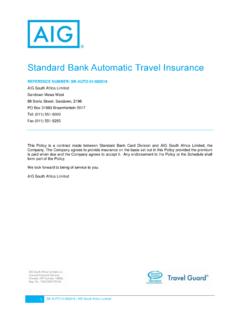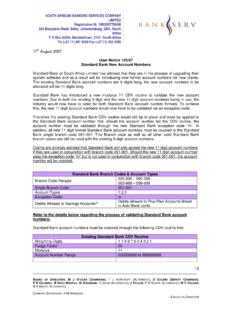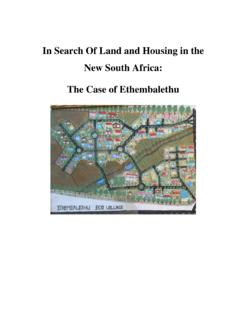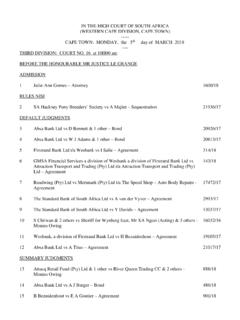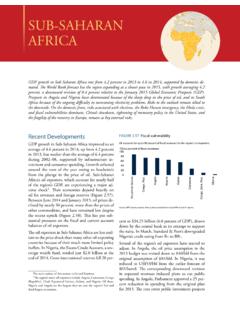Transcription of THE SUPREME COURT OF APPEAL OF SOUTH AFRICA …
1 THE SUPREME COURT OF APPEAL OF SOUTH AFRICA JUDGMENT Case no: 492/12 Reportable In the matter between: North East Finance (Pty) Ltd Appellant and Standard bank of SOUTH AFRICA Ltd Respondent Neutral citation: North East Finance v Standard bank (492/2012) [2013] ZASCA 76 (20 May 2013) Coram: Lewis, Ponnan, Shongwe and Saldulker JJA and Zondi AJA Heard: 20 May 2013 Delivered: 29 May 2013 Summary: A clause in a contract requiring parties to refer their disputes to arbitration is not as a rule enforceable if the contract itself is invalid. Whether the clause is separable from the contract such that it too is not invalid depends on an interpretation of the contract as a whole, and the context in which it was concluded. 2 ORDER On APPEAL from SOUTH Gauteng High COURT , Johannesburg (Hodes AJ sitting as COURT of first instance) The APPEAL is dismissed with costs including those of two counsel.
2 JUDGMENT _____ Lewis JA (Ponnan, Shongwe and Saldulker JJA and Zondi AJA concurring) [1] If there are substantive reasons to believe that a contract has been induced by fraud, does a clause in the contract requiring the parties to submit any dispute between them to arbitration bind the aggrieved party? This APPEAL turns on that question and on a construction of the arbitration clause itself. The SOUTH Gauteng High COURT (Hodes AJ) found that allegations of fraud (inducing the contract between the parties) made by the respondent, Standard bank of SOUTH AFRICA Ltd (the bank ), against the appellant, North East Finance (Pty) Ltd (North East), did not appear unfounded, and constituted sufficient grounds for it not to compel the bank to submit to arbitration. The high COURT thus declined the application by North East to compel such a reference. The APPEAL is with leave of the high COURT .
3 The factual matrix [2] The questions to be determined must be considered against the factual matrix or context of the contract, termed a settlement agreement by the parties. In summary, this was that North East conducted business by financing the acquisition of goods by concluding rental agreements with end-users. North East discounted the debts owed to it by end-users with the bank in terms of an agreement of cession. The business between the parties commenced in 1999, and the operative cession agreement was concluded in 2001. In terms of the cession North East ceded its rights under various rental agreements to the bank , and agreed to offer contracts to 3 the bank from time to time. The bank was entitled to accept such offers in its absolute discretion. [3] The cession agreement was amended from time to time. In particular an addendum (the collection addendum) was added in 2003, and it entitled North East to collect payments directly from debtors (end-users).
4 The bank would in turn claim payment from North East. That agreement was in turn amended in May 2007. Disputes about the collection of rentals, and the debiting of North East s bank account with the bank , arose in 2008. [4] In September 2008, following negotiations and meetings to resolve the disputes, the parties entered into a settlement agreement , the purpose of which was to phase out and then terminate North East s collection function. The agreement was drafted by Mr Nimrod van Zyl, North East s attorney, and the brother of the deponent to the founding and replying affidavits in the application, Mr Hermanus van Zyl. The latter was a director of North East. The arbitration clause in issue in this matter was in the settlement agreement, clause of which provided: In the event of any dispute of whatsoever nature arising between the parties (including any question as to the enforceability of this contract but excluding the failure to pay any amount due unless the defaulting party has, prior to the due date for such payment, by notice in writing to the other party disputed liability for such payment), such dispute will be referred to arbitration in the manner set out below.
5 (My emphasis.) [5] Prior to the conclusion of the settlement agreement the bank s head of technology finance, Mr Mark Peters, became involved in the attempts to resolve the disputes. Although he did not sign the agreement for the bank , he was conversant with the nature of the disputes that had arisen, and he deposed to the answering affidavit for the bank . He was also instrumental in implementing the agreement, primarily in collecting the debts owed, estimated in 2008 to be worth some R660 million. 4 [6] The process of collection proved more difficult than anticipated. Peters and his team found it hard to get access to information and to understand the systems and processes used by North East prior to the conclusion of the settlement agreement. It is not necessary to examine the details of the investigation, or its outcome, described by Peters.
6 Suffice to say that after some time Peters concluded that the settlement agreement was induced by fraudulent misrepresentations and non-disclosures: by 2010, he said, he had discovered that procedures had been flouted by North East; transactions had been disguised, funds embezzled and other serious breaches of the fiduciary duty owed by North East to the bank had occurred. Peters concluded that these irregularities must have been known to Hermanus van Zyl at the time when the settlement agreement was concluded. By deliberately failing to make disclosure of all the irregularities, the bank claimed, North East induced the bank to conclude the contract. [7] Having discovered the fraud, the bank elected to resile from the agreement and to regard it as void ab initio. It refused to submit the question as to whether there had been fraud inducing the contract to arbitration, maintaining that the arbitration clause fell with the contract (and indeed asserting that the clause had been included in the agreement as part of the fraudulent strategy of the Van Zyls).
7 North East, on the other hand, contended that any dispute between the parties had to be submitted to arbitration, including one as to the enforceability of the contract. North East, after calling for various pre-arbitration meetings (in terms of clause of the agreement) which the bank refused to attend, launched an application in the high COURT for an order that a dispute existed as to whether the settlement agreement was void ab initio; that the dispute was arbitrable in terms of clause of the agreement; and that a dispute between the parties regarding the quantum of a payment to be made under the settlement agreement was also arbitrable. 5 The findings of the high COURT [8] The high COURT made several findings: that there were numerous disputes of fact relating to the fraudulent conduct of North East, and the conclusion of the settlement agreement, that could not be resolved on the papers before it; that the arbitration clause was part of the agreement and had no separate existence; that the allegations of fraud were not wholly unfounded on the bank s version; that the arbitration clause did not refer to fraudulent misrepresentations inducing the contract specifically, such that this was not an issue to be determined by arbitration; that the agreement to arbitrate was not severable form the rest of the settlement agreement; and that accordingly, the COURT would not compel the bank to comply with the clause.
8 The legal issues [9] On APPEAL , North East contended that the arbitration clause conferred jurisdiction on an arbitrator despite the allegations of fraud inducing the settlement agreement, and that in any event the allegations of fraud were denied, or were based on hearsay evidence or secondary facts . The finding of the high COURT that, on the bank s version, the allegations of fraud were not wholly unfounded could lead, it was argued, to a party escaping an arbitration clause, when it was no longer considered desirable, by simply alleging fraud. [10] The bank argued that there were three issues for determination on APPEAL : whether the arbitration clause could survive the demise of the agreement in which it was included; whether it was divisible from the remainder of the contract and would govern the determination of the question whether there was fraud that induced the agreement including the clause itself; and whether the bank had laid a basis sufficient to persuade the COURT not to refer the question of fraud to arbitration.
9 [11] As I see it, there are really only two issues for determination. First, whether the particular arbitration clause should be construed so as to compel submission to arbitration on whether the bank was induced by North East s fraud to conclude the 6 settlement agreement; and if so whether the allegations of fraud do not appear to be wholly unfounded . The effect of fraud on an arbitration clause in general [12] The first principle that the bank argued required consideration is really not in question. If a contract is void from the outset then all of its clauses, including exemption and reference to arbitration clauses, fall with it. The principle was most recently enunciated by this COURT in North West Provincial Government & another v Tswaing Consulting & others1 where Cameron JA said that an arbitration clause embedded in a fraud-tainted agreement could not stand.
10 The COURT referred in this regard to Wayland v Everite Group Ltd2 which in turn relied on Allied Mineral Development Corporation (Pty) Ltd v Gemsbok Vlei Kwartsiet (Edms) That decision referred to Heyman & another v Darwins Ltd4 where Viscount Simon LC said: An arbitration clause is a written submission, agreed to by the parties to the contract, and, like other written submissions to arbitration, must be construed according to its language and in the light of the circumstances in which it is made. If the dispute is as to whether the contract which contains the clause has ever been entered into at all, that issue cannot go to arbitration under the clause, for the party who denies that he has ever entered into the contract is thereby denying that he has ever joined in the submission. Similarly, if one party to the alleged contract is contending that it is void ab initio (because, for example, the making of such a contract is illegal), the arbitration clause cannot operate, for on this view the clause itself is also void.










